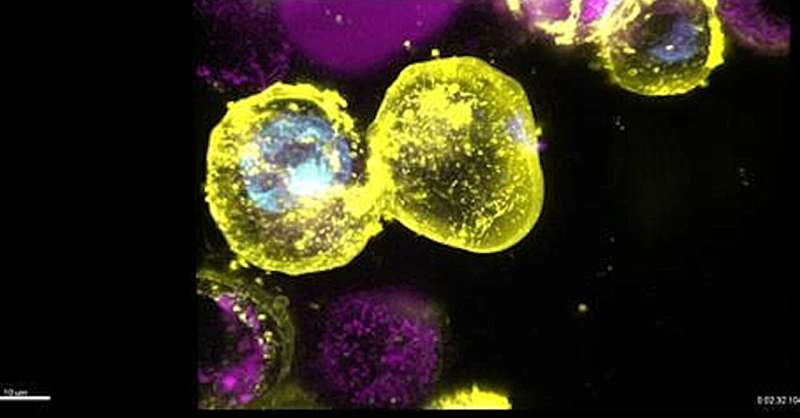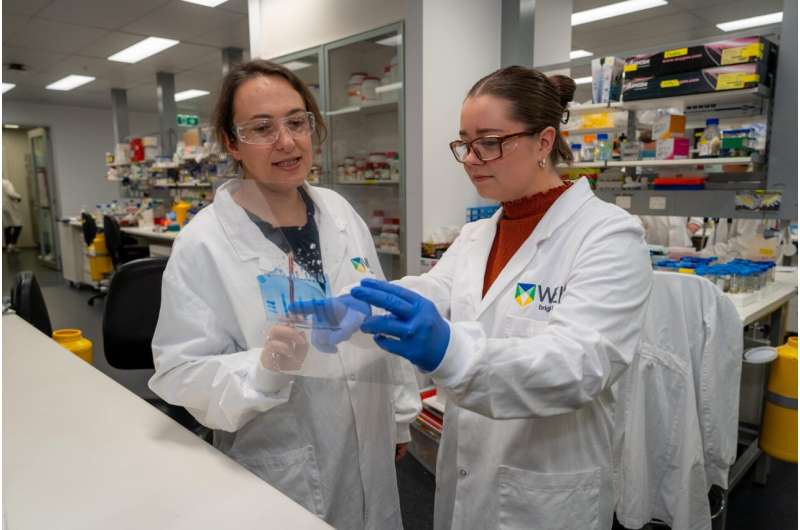This article has been reviewed according to Science X's editorial process and policies. Editors have highlighted the following attributes while ensuring the content's credibility:
fact-checked
peer-reviewed publication
trusted source
proofread
When cells go boom: Study reveals inflammation-causing gene carried by millions

Australian researchers at Walter and Eliza Hall Institute (WEHI) have found that a genetic change that increases the risk of inflammation, through a process described as "explosive" cell death, is carried by up to 3% of the global population.
The study may explain why some people have an increased chance of developing conditions like inflammatory bowel disease or suffer more severe reactions to infections with bacteria like Salmonella.
Immune power of 'explosive' cell death
Every minute, millions of cells in our bodies die on purpose. Cell death is an essential process that protects our bodies from disease by removing unwanted, damaged or dangerous cells, and preventing the spread of viruses, bacteria, and even cancer.
WEHI's Dr. Sarah Garnish is first author on a paper, published in Nature Communications and said that while there are various types of cell death, necroptosis is distinguished by its ferocity—the cells essentially explode, which sounds an alarm for other cells in the body to respond.
The study is titled "A common human MLKL polymorphism confers resistance to negative regulation by phosphorylation."
"This is a good thing in the case of a viral infection, where necroptosis not only kills the infected cells but instructs the immune system to respond, clean things up, and start a more specific, long lived immune response," Dr. Garnish said.
"But when necroptosis is uncontrolled or excessive, the inflammatory response can actually trigger disease."
Genetic brakes
The gatekeeper of necroptosis is the gene MLKL. When the body needs to trigger a cell death response with plenty of firepower, the cellular brakes that normally keep MLKL in-check are released. However, some of us make a form of MLKL with flimsy brakes.
Dr. Garnish and her co-authors have been able to quantify this at a population level for the first time.
"For most of us, MLKL will stop when the body tells it to stop, but 2–3% of people have a form of MLKL that is less responsive to stop signals," Dr. Garnish said.
"While 2–3% doesn't seem like much, when you consider the global population, this adds up to many millions of people carrying a copy of this gene variant."
Project leader Dr. Joanne Hildebrand said the research proposes that a common genetic change like this can combine with a person's lifestyle, infection history and broader genetic makeup to increase the risk of inflammatory diseases and severe reactions to infections.
This is known as polygenic risk—the combined influence of multiple genes on developing a certain trait or condition.

"Taking type 2 diabetes as an example, it's rare that just one gene change determines whether someone will develop the condition," Dr. Hildebrand said.
"Instead many different genes play a role, as do environmental factors, like diet and smoking."
Dr. Hildebrand said it's not as simple as directly connecting this difference in the MLKL gene with the chance of someone developing a specific condition.
"We haven't tagged this MLKL gene variant to any one particular disease yet, but we see real potential for it to combine with other gene variants, and other environmental cues, to influence the intensity of our inflammatory response."
Towards personalized medicine
Our understanding of MLKL has come a long way since it surfaced by chance in a WEHI lab more than 20 years ago. Today's research opens the door for future tests and screening to determine disease risks.
Genome sequencing is becoming cheaper and more readily accessible. As more genomic data becomes available to researchers, it increases the likelihood that they can link common genetic variants, like the one described for MLKL, with disease.
In the future researchers hope to pinpoint the genetic changes that might mean someone is more likely to have a severe case of COVID-19, or less likely to bounce back after chemotherapy.
"Every piece of information like this helps us make personalized medicine more of a reality," said Dr. Garnish.
The WEHI team is also investigating whether uncontrolled necroptosis could be beneficial in some circumstances. For example, could people with the MLKL gene variant have a stronger cellular defensive response to certain viruses?
"Gene changes like this don't usually accumulate in the population over time unless there is a reason for it—they generally get passed on because they do something good," said Dr. Garnish.
"We're looking at the downsides of having this gene change, but we're looking for the upsides as well."
More information: Sarah E. Garnish et al, A common human MLKL polymorphism confers resistance to negative regulation by phosphorylation, Nature Communications (2023). DOI: 10.1038/s41467-023-41724-6




















